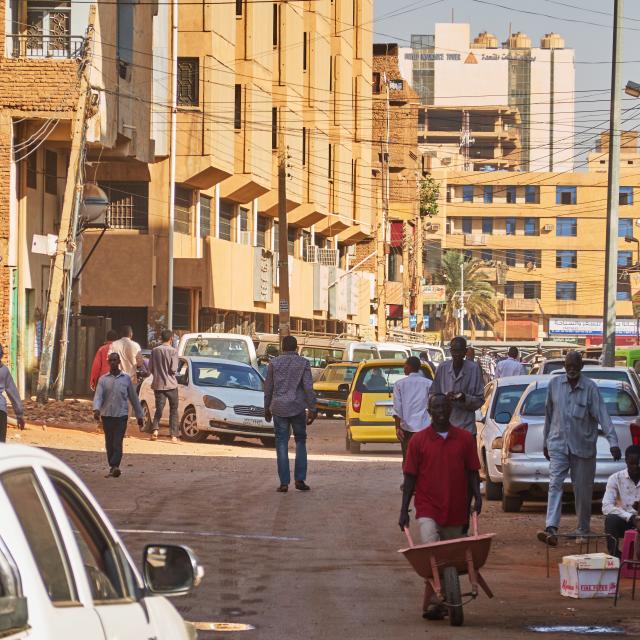National Television Roundtable: “Protecting Children from the Impacts of Climate Change”
 News
News

Busy street scene in downtown Khartoum, Sudan.
Credit: Geogif
This note was cross-published with our partners in this event series, Shabaka. To read about the event on their website, click here.
This note summarises the findings of a closed roundtable discussion convened on 12 August 2024 by NatCen International, the global arm of the National Centre for Social Research (NatCen), Shabaka, and the Centre on Armed Groups ahead of this year’s World Humanitarian Day. This online closed roundtable, held under Chatham House rules, explored the role of humanitarian diplomacy in the Sudan crisis, with a focus on bringing insights from outside the humanitarian system in Sudan, as well as other crises such as Myanmar, Syria, and Yemen.
The event was chaired by Sherine El Taraboulsi–McCarthy, Director of NatCen International, Elvina Quaison, Interim CEO of Shabaka, and Ashley Jackson, Co-Executive Director of the Centre on Armed Groups. Expert speakers included Ibrahim Jalal, non-resident scholar at the Malcolm H. Kerr Carnegie Middle East Centre; Kholood Khair, Founding Director of Confluence Advisory; Dr Hazem Rihawi, Senior Advocacy Officer at the White Helmets; and Aung Zaw Win, Operations Manager for Green Life Alliance for Development (GLAD).
Participants in the closed roundtable included humanitarian researchers, practitioners, and policymakers based in Africa, Europe, the Middle East, and the US, as well as civil society representatives and diaspora humanitarians from Haiti, Myanmar, Sudan, Syria, and Yemen.
The roundtable discussion included expert speaker presentations on examples of humanitarian diplomacy’s successes and failures from Myanmar, Sudan, Syria, and Yemen. The following questions were used to frame the discussion:
Key messages from the session include the following:
The session chairs thanked participants for their time and invaluable contributions. Sherine El Taraboulsi McCarthy stressed that the discussion also highlighted the need for further research in this area to help build the evidence base on different approaches to humanitarian diplomacy. She explained that NatCen, Shabaka, and the Centre on Armed Groups will agree on the most useful type of publication to capture very rich discussion and key points from the session.
For Shabaka, Elvina Quaison stressed the need to recognise the vital contributions of local mutual aid groups and diaspora humanitarians to crisis response in Sudan and other contexts, and to ensure that the perspectives and experiences of local civil society and affected communities are included in humanitarian, peacebuilding, and reconstruction initiatives now, not after the fact.
Receive a regular update, sent directly to your inbox, with a summary of our current events, research, blogs and comment.
Subscribe